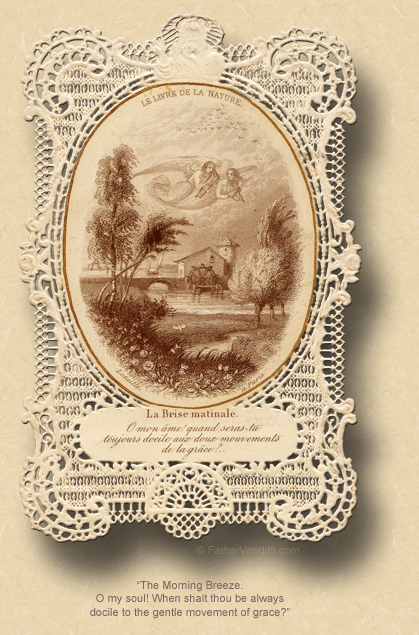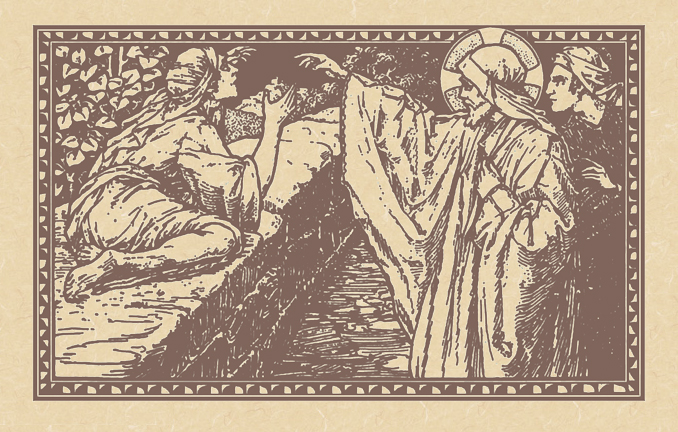The Answer Is Blowin' in the Wind.
The Twenty-Ninth Friday of Ordinary Time.
Lessons from the secondary feria, according to the ordinary form of the Roman Rite:
• Ephesians 4: 1-6.
• Psalm 24: 1-6.
• Luke 12: 54-59.
The Twentieth Friday after Pentecost.*
Lessons from the dominica,* according to the extraordinary form of the Roman Rite:
• Ephesians 5: 15-21.
• Psalm 144: 15-16.
• John 4: 46-53.
The Twentieth Friday after Pentecost; the Feast of the Holy Martyr Nestor; and, the Feast of the Holy Martyr Capitolina & Her Servant, Erotheides.
First & third lessons from the pentecostarion, second & fourth from the menaion, according to the Ruthenian recension of the Byzantine Rite:
• Colossians 2: 1-7.
• Ephesians 6: 10-17.
• Luke 11: 23-26.
• Luke 21: 12-19.
FatherVenditti.com
|
 7:03 AM 10/27/2017 — People always seem to be interested in the weather. Well, at least they pretend to be, as talking about the weather is kind of a cliché when you want to break the ice with someone. Our Blessed Lord talks about the weather in today’s Gospel lesson, but it’s not to break the ice; he’s giving his listeners something to think about: they can read the signs of the weather with very little to go on, but they seem unable to read the abundant signs, predicted throughout the Old Testament, about the coming of the Messiah. They’re blind to the numerous miracles He’s already performed in their presence. They read the clear testimony of the prophets of old, see them being fulfilled one after another in the life and ministry of our Lord, but can’t—or won’t—make the connection, probably because they had predetermined that Jesus just couldn’t be what He claims to be. God was right there among them, and they couldn’t recognize him. 7:03 AM 10/27/2017 — People always seem to be interested in the weather. Well, at least they pretend to be, as talking about the weather is kind of a cliché when you want to break the ice with someone. Our Blessed Lord talks about the weather in today’s Gospel lesson, but it’s not to break the ice; he’s giving his listeners something to think about: they can read the signs of the weather with very little to go on, but they seem unable to read the abundant signs, predicted throughout the Old Testament, about the coming of the Messiah. They’re blind to the numerous miracles He’s already performed in their presence. They read the clear testimony of the prophets of old, see them being fulfilled one after another in the life and ministry of our Lord, but can’t—or won’t—make the connection, probably because they had predetermined that Jesus just couldn’t be what He claims to be. God was right there among them, and they couldn’t recognize him.
The Lord is continually passing by in our lives. He announces His presence to us by a variety of ways, but so often we don’t recognize Him. He’s present in our sickness and tribulations which, if we accept God’s will, can serve to purify us. He’s there in the people we work with, in those who need our help, in the members of our families, in the daily hustle and bustle of everyday life. Behind that piece of good news we’ve just received He’s there waiting for us to give thanks; and, when bad news comes our way or someone has thrown a cross in our path, He’s there waiting for us to call upon Him for help. Today’s lesson is from the end of Luke 12, but back in the middle of the chapter He tells us:
You should not be asking, then, what you are to eat or drink, and living in suspense of mind; it is for the heathen world to busy itself over such things; your Father knows well that you need them. No, make it your first care to find the kingdom of God, and all these things shall be yours without the asking (Luke 12: 29-31 Knox).
That’s a rather stinging rebuke, but well taken. When we wring our hands over worldly things that don’t matter and ignore the things that do, we act like pagans and heathens, almost as if we’ve never read the Gospel.
The strength of our faith depends to a great extent on the disposition of our will. When we fail to break off a dangerous relationship, when we allow ourselves to be placed—or even place ourselves—in an occasion of sin, that’s an act of the will over which we do have control. An obscure Father of the Church, Saint Theophilus of Antioch, once said,
God gives sight to those who are capable of seeing Him. This is because the eyes of their mind are open to Him. Everyone has eyes, but some people keep them screened from the light of the sun. They cannot see the sun at all. But even though the blind cannot see the sun, it continues to shine. So the people who can’t see ought to blame their inability to see on their own defective vision (Book 1, 2, 7).
In other words, if we’re stumbling through life waiting for God to show us the way, but have done nothing to remove from our behavior those things which are clearly not consistent with the way of life our Lord has taught us, how can we possibly hope to see those “signs of the times” of which our Lord speaks in today’s lesson?
Baden-Powell, the founder of the Boy Scout movement, once berated a scout master because he never took his troop on wilderness outings, and the scout master replied, “They don’t want to go outside.” And Baden-Powell replied, “Of course they don’t want to go outside; they’ve never been outside.” If we’re not living a moral life and cultivating a spiritual outlook, then how can we possibly detect the movement of the Spirit of God in the encounters and activities of our daily lives?  God will not shout at us. Remember the example of the Prophet Elijah I’ve pointed out to you so many times: he’s wandering around waiting for God to show him some kind of sign, but God was right there next to him all along, “…in the whisper of a gentle breeze” (I Kings 19: 12 Knox). He just hadn’t purged from his life the distractions of the world enough to be able to hear it. God will not shout at us. Remember the example of the Prophet Elijah I’ve pointed out to you so many times: he’s wandering around waiting for God to show him some kind of sign, but God was right there next to him all along, “…in the whisper of a gentle breeze” (I Kings 19: 12 Knox). He just hadn’t purged from his life the distractions of the world enough to be able to hear it.
Saint Augustine recounts his personal experience before his conversion:
For there was a hunger within me from a lack of that inner food, which is Yourself, my God. Yet by that hunger I did not hunger, but was without desire for incorruptible food, not because I was already filled with it, but because the more empty I was, the more distaste I had for it (Confessions, III, 1).
Our Lord ends His instruction to us today with a peculiar analogy about settling with your opponent before you get to the court house. He’s not giving legal advice. He’s pointing out that all of us are continually traveling the road that leads to our Final Judgment, and the “opponent” of which He speaks are all those worries and concerns and resentments and passions that tempt us off the straight and narrow road. For the fifth or sixth time in as many weeks, I’ll repeat what has clearly become my favorite homiletic tag-line: “Our one purpose for being on this earth is to work out our salvation. Everything else is just window-dressing.” The words are easy to say, not so easy to appreciate when we feel burdened by so many worldly concerns, but Saint Augustine said it much better: “Thou hast made us for Thyself, O Lord, and our hearts are restless until they rest in Thee” (Confessions, I, 1).

* In the extraordinary form, on the ferial days outside of privileged seasons, the lessons are repeated from the previous Sunday.
|

